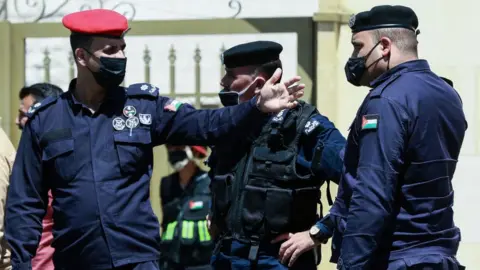Jordan jails two senior figures convicted of plotting coup
 AFP
AFPA military court in Jordan has found a former royal court chief and a relative of King Abdullah guilty of sedition.
Bassem Awadallah and Sharif Hassan bin Zaid, who had denied the charge, were sentenced to 15 years in prison after a trial that shocked Jordanians and embarrassed the monarchy.
They were detained in April and accused of conspiring with former Crown Prince Hamzah to destabilise the nation.
Prince Hamzah, who is the king's half-brother, was spared a trial.
The king decided to deal with the prince's case "within the framework" of the royal family after he publicly pledged his allegiance.
The BBC's security correspondent Frank Gardner says Jordan has always been something of a fragile state, sandwiched between troubled neighbours and blessed with few natural resources.
The one constant factor holding it together has been loyalty to the monarchy, but the coronavirus pandemic and economic hardship have led to whisperings of discontent, he says.
Our correspondent adds that it was an eye-opener for ordinary citizens when such a senior and well-loved figure as Prince Hamzah released two videos in early April in which he said he was under house arrest and was being silenced for voicing allegations of government corruption and misrule.
He denied any wrongdoing, but the government said he and his alleged conspirators had liaised with "foreign entities" and sought to mobilise "clan leaders".
After mediation, Prince Hamzah signed a letter reaffirming he was "committed to the constitution".
Eighteen people were arrested over the alleged plot, but only Awadallah and Sharif Hassan were charged.
They went on trial last month at the State Security Court for "incitement against the political regime" and "carrying out acts that endanger the safety and security of society and stirring up sedition".
An indictment alleged they had conspired with Prince Hamzah who, it said, "was determined to fulfil his personal ambition to rule".
The trial took place behind closed doors and ended after only six sessions. A request by the defence to call witnesses, including Prince Hamzah, was denied.
Delivering the verdict on Monday, the judge said the defendants had tried to put into action "ideas that are hostile to the existing political system in the kingdom and his majesty King Abdullah".
A US-based lawyer hired by Awadallah's family told the Associated Press that the trial was "completely unfair" and that Awadallah had been tortured in detention. Prosecutors denied the claim.
